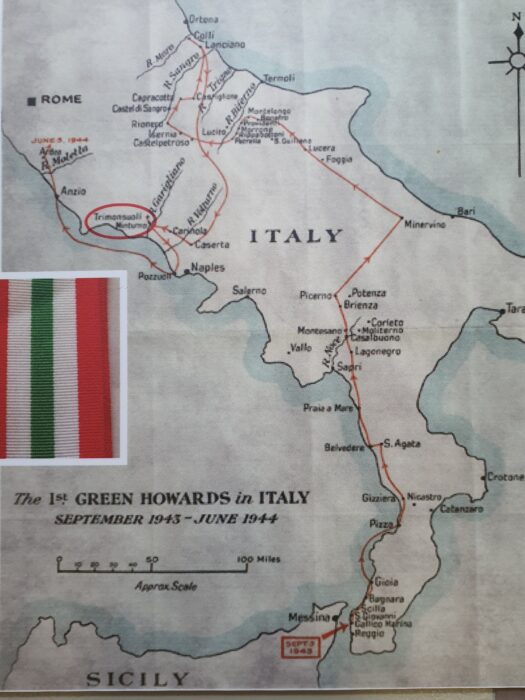Medals awarded
- Distinguished Conduct Medal
- 1939-1945 Star
- Africa Star 1940-1943
Clasp: 8th Army - Italy Star 1943-1945
- Defence Medal 1939-1945
- War Medal 1939-1945

Medals are shown left to right, as per the bullet point list above.
Having already distinguished himself during the advance through Sicily, Lance-Sergeant Robinson was in command of a patrol sent to gather information about enemy positions north of Minturno, which is on the west coast of Italy, between Rome and Naples. A grenade exploded in front of him, lacerating Henry’s face and body, with several splinters entering his eyes. Although in intense pain, he was able to send back the information he had already gathered, and continue his reconnaissance until his eyes completely closed.

Churchill’s vision of a ‘soft underbelly’ to Europe proved to be an underestimation. The advance north towards the Apennines and the Adriatic coast saw the Germans contest every river and ridge line. The soft underbelly had become, in the words of General Mark Clark, a ‘tough old gut.’
By mid January 1944, the Green Howards were north west of Naples. Ahead of them was the swollen Garigliano river and heavily mined swamps which needed crossing before an attack could start on the well-defended hill towns of Minturno and Trimonsuoli. It was during this phase of the advance at Minturno that Robinson carried out his reconaissance.
Despite his wounds and extremely limited vision, Henry Robinson was able to regain his unit lines, a feat of determination and courage, which took more than 15 hours to achieve. This action led to him being awarded the Distinguished Conduct Medal. Robinson showed, ‘a tenacity of purpose worthy of the highest traditions of the British Army.’
Henry Robinson never fully recovered from the injuries sustained in Italy in 1944. He was registered blind two years before his death in 1992.
